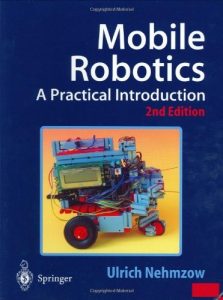Mobile Robotics: A Practical Introduction (2nd edition) is an excellent
introduction to the foundations and methods used for designing completely
autonomous mobile robots.
A fascinating, cutting-edge, research topic, autonomous mobile robotics is
now taught in more and more universities. In this book you are introduced
to the fundamental concepts of this complex field via twelve detailed case
studies that show how to build and program real working robots.
Topics covered in clued learning, autonomous navigation in unmodified,
noisy and unpredictable environments, and high fidelity robot simulation.
This new edition has been updated to include a new chapter on novelty
detection, and provides a very practical introduction to mobile robotics
for a general scientific audience. It is essential reading for 2nd and
3rd year undergraduate students and postgraduate students studying
robotics, artificial intelligence, cognitive science and robot
engineering. The update and overview of core concepts in mobile robotics
will assist and encourage practitioners of the field and set challenges to
explore new avenues of research in this exiting field.
The author is Senior Lecturer at the Department of Computer Science at the
University of Essex.
"A very fine overview over the relevant problems to be solved in the
attempt to bring intelligence to a moving vehicle."
Professor Dr. Ewald von Puttkamer, University of Kaiserslautern
"Case studies show ways of achieving an impressive repertoire of kinds of
learned behaviour, navigation and map-building. The book is an admirable
introduction to this modern approach to mobile robotics and certainly
gives a great deal of food for thought. This is an important and
though-provoking book."
Alex M. Andrew in Kybernetes Vol 29 No 4 and Robotica Vol 18
introduction to the foundations and methods used for designing completely
autonomous mobile robots.
A fascinating, cutting-edge, research topic, autonomous mobile robotics is
now taught in more and more universities. In this book you are introduced
to the fundamental concepts of this complex field via twelve detailed case
studies that show how to build and program real working robots.
Topics covered in clued learning, autonomous navigation in unmodified,
noisy and unpredictable environments, and high fidelity robot simulation.
This new edition has been updated to include a new chapter on novelty
detection, and provides a very practical introduction to mobile robotics
for a general scientific audience. It is essential reading for 2nd and
3rd year undergraduate students and postgraduate students studying
robotics, artificial intelligence, cognitive science and robot
engineering. The update and overview of core concepts in mobile robotics
will assist and encourage practitioners of the field and set challenges to
explore new avenues of research in this exiting field.
The author is Senior Lecturer at the Department of Computer Science at the
University of Essex.
"A very fine overview over the relevant problems to be solved in the
attempt to bring intelligence to a moving vehicle."
Professor Dr. Ewald von Puttkamer, University of Kaiserslautern
"Case studies show ways of achieving an impressive repertoire of kinds of
learned behaviour, navigation and map-building. The book is an admirable
introduction to this modern approach to mobile robotics and certainly
gives a great deal of food for thought. This is an important and
though-provoking book."
Alex M. Andrew in Kybernetes Vol 29 No 4 and Robotica Vol 18






